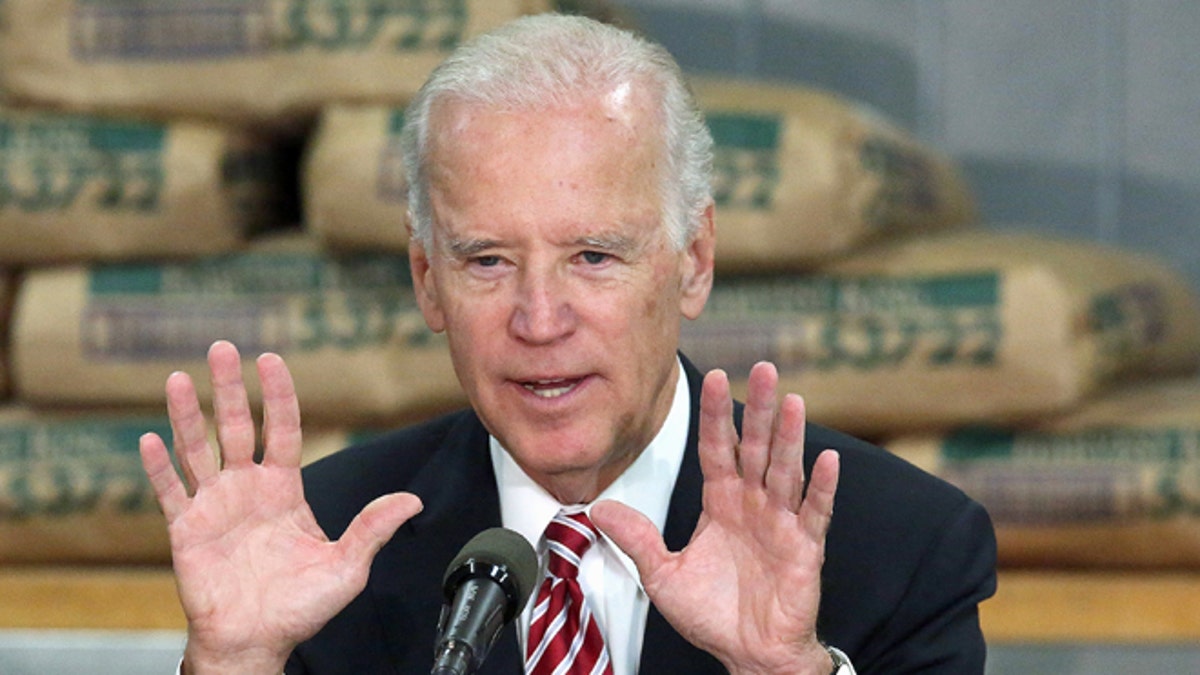
In this Tuesday, Oct. 7, 2014 photo, Vice President Joe Biden speaks at a roundtable discussion with business leaders in Los Angeles, Calif. (AP)
Vice President Biden apologized Tuesday to a top Saudi official for remarks last week suggesting key U.S. allies destabilized Syria by sending arms and money to extremists.
The phone call is the latest effort by the VP to patch up relations with U.S. partners in the war against the Islamic State. Biden previously apologized to leaders of Turkey and the United Arab Emirates – he had mentioned all three nations in his criticism last week.
According to a brief statement from the vice president’s office, Biden spoke Tuesday with Saudi Arabian Foreign Affairs Minister Prince Saud Al-Faisal.
“The Vice President thanked the Foreign Minister for Saudi Arabia’s strong support in the shared fight against ISIL and he clarified his recent remarks regarding the early stages of the conflict in Syria,” the statement said. “The two agreed that the issue was closed.”
The round of phone calls appeared to conclude Biden’s diplomatic clean-up for now. The fallout over Biden’s remarks is perhaps unprecedented – his verbal miscues typically cause headaches for the White House, but otherwise are diplomatically harmless.
His off-the-cuff remarks Thursday at Harvard University, though, enraged U.S. allies, just days after the U.S. and several Arab nations launched a coordinated airstrike campaign against the Islamic State in Syria. Two of the countries Biden mentioned – Saudi Arabia and the United Arab Emirates – had joined the U.S. in the airstrike campaign.
Speaking at Harvard, Biden had said that "our biggest problem is our allies" in responding to the civil war in Syria.
"The Turks … the Saudis, the Emiratis, etc. What were they doing? They were so determined to take down Assad and essentially have a proxy Sunni-Shia war," Biden said.
"What did they do?” he continued. “They poured hundreds of millions of dollars and thousands of tons of weapons into anyone who would fight against Assad -- except that the people who were being supplied were al Nusra and al Qaeda and the extremist elements of jihadis coming from other parts of the world."
He also suggested Turkish President Recep Tayyip Erdogan told him privately: “You were right. We let too many people through.”
Erdogan reportedly denied making such remarks and said Biden would become "history to me" over the comments unless he apologized.
Biden later apologized to Erdogan and spoke with another UAE official to clarify his remarks.
Despite the fallout over the vice president’s remarks, some observers said the real problem wasn’t the veracity of the allegation – but the fact he leveled the charge publicly.
“What he said was actually right, but he shouldn’t have said it,” said KT McFarland, Fox News analyst and former security official in the Nixon, Ford and Reagan administrations.
The incident also marked the latest in a line of remarks Biden has had to walk back, including a recent speech where he referred to bad actors in the housing market as "Shylocks" -- considered by some to be an offensive term for Jews. White House Press Secretary Josh Earnest was peppered with questions on Monday about these remarks specifically and Biden's tendency generally to make them.
"The vice president is somebody who has enough character to admit when he's made a mistake," Earnest said.
Earnest declined to comment in detail on whether the administration believes these countries did in fact inflame the situation inside of Syria. He said Biden's apology to Erdogan related specifically to him "mischaracterizing the [Turkish] president's views in a private conversation."
He stressed that these countries "understand the threat" posed by the Islamic State and said the U.S. is focused on "ensuring that we can work with other countries in the region to prevent support flowing to extremists who are operating in the area."
In the wake of Biden's remarks, Earnest claimed the White House doesn't see these countries treating the fight against ISIS as "anything less than a top priority."
He nevertheless acknowledged that the fact Biden made those phone calls "is an indication that he himself wishes that he had said it a little bit differently.”
The Associated Press contributed to this report.












































